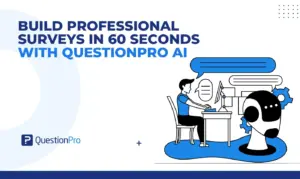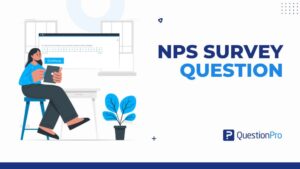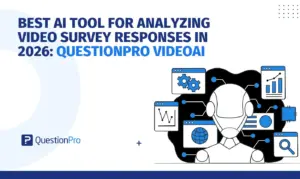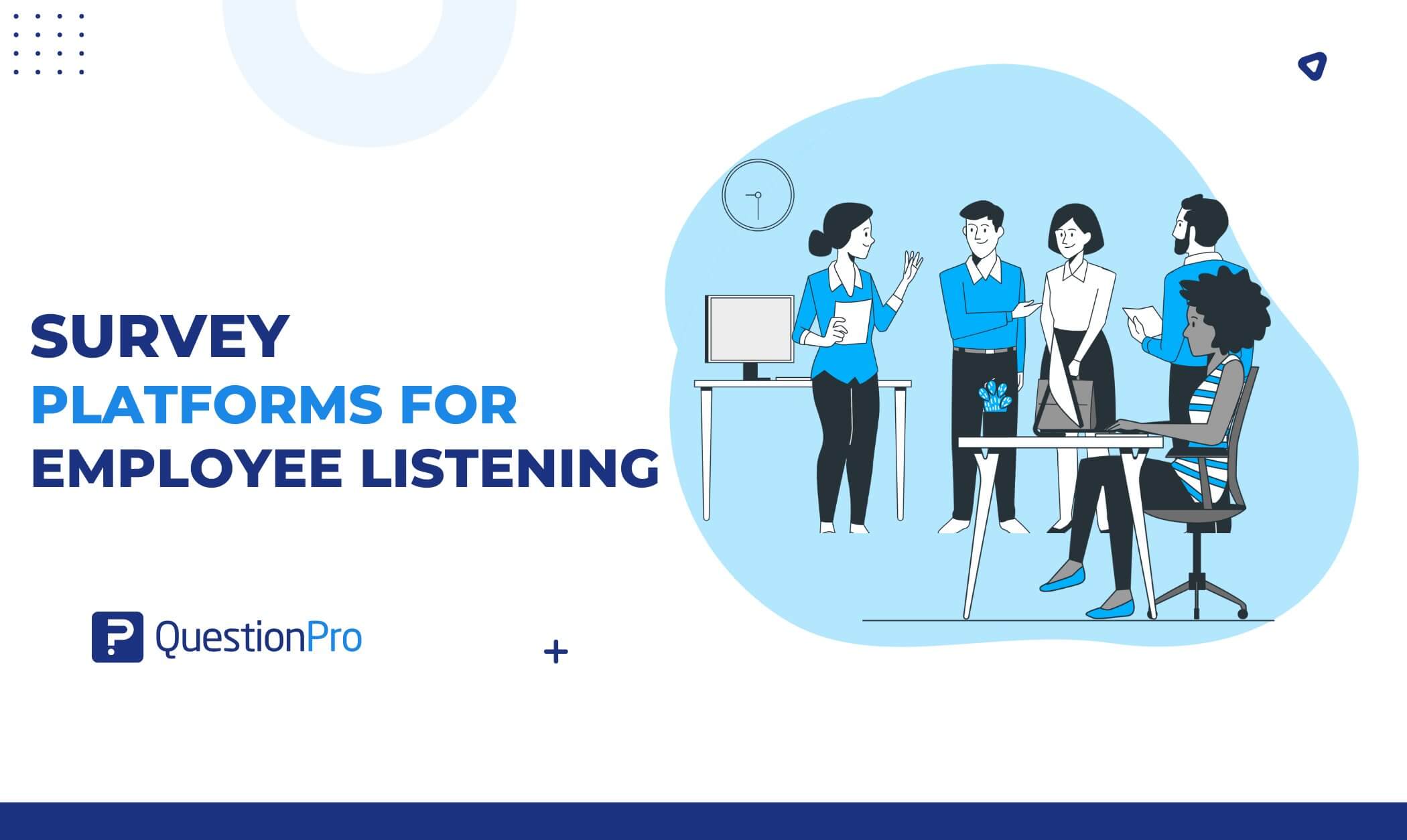
Are you looking for survey platforms for employee listening in your workplace? Modern survey platforms offer powerful employee survey tools to gather real-time insights, measure employee sentiment, and identify areas for improvement.
A strong work culture boosts engagement, productivity, and retention. To succeed, companies must listen to employees, understand their needs, and take action. Employee listening—through surveys and feedback tools—helps businesses boost workplace satisfaction and drive positive change.
From pulse surveys to in-depth engagement assessments, these platforms enable HR leaders and managers to make data-driven decisions that shape a more inclusive, supportive, and high-performing work culture.
In this article, we explore the top survey platforms designed for employee listening, their key features, and best practices for leveraging feedback to create a workplace culture where employees feel safe, valued, and motivated.
What is a Survey?
A survey is a valuable method of gathering information from a group of people by asking them questions. It helps organizations collect feedback, opinions, or data to make informed decisions.
Surveys can be:
- Anonymous or named.
- Short (pulse surveys) or detailed.
- Done online, via email, or in person.
Common uses in the workplace:
- Measuring employee satisfaction.
- Identifying areas for improvement.
- Tracking engagement and morale.
Surveys provide valuable insights to improve work culture, policies, and employee experience.
Learn More: Employee Satisfaction and Ways To Measure It.
What is Employee Listening?
Employee listening is the process of actively gathering, understanding, and acting on employee feedback to improve workplace culture, engagement, and performance. It goes beyond surveys—it’s about creating a continuous dialogue where employees feel heard and valued.
Key Aspects:
- Feedback Channels: Surveys, polls, 1:1 meetings, suggestion boxes, and digital platforms.
- Action-Oriented: Not just collecting feedback, but analyzing it and making meaningful changes.
- Continuous Process: Regular check-ins (not just once a year) to track sentiment and needs.
Why It Matters:
- Boosts morale, retention, and productivity.
- Uncovers hidden issues before they escalate.
- Builds trust by showing employees their voices matter.
Example: A company uses pulse surveys and manager check-ins to address burnout and shares how feedback led to new wellness programs.
Learn More: Pulse Survey Software and Analytics.
Why is Employee Listening Important?
Think about the last time you felt genuinely heard at work. It changes everything. That’s the power of a strong employee listening strategy – transforming workplaces from “just a job” to where people want to grow.
Here’s why this matters more than ever:
- The Engagement Lifeline
Regular employee engagement surveys direct you to what’s happening in your teams. They’re like a wellness check for your company culture.
- The DEI Mirror
Want to make progress on diversity, equity, and inclusion? Start by listening. You’ll uncover blind spots and opportunities you never knew existed.
- The Retention
Those key insights about job satisfaction? They’re your early warning system for keeping top talent from walking out the door.
- The Culture Catalyst
Every piece of employee input is a building block to enhance workplace culture. Even small changes based on feedback can ripple through your entire organization.
The magic happens when you:- Gather immediate insights (pulse surveys work wonders)
- Analyze data instead of just collecting it
- Make visible organizational changes based on what you learn
Companies that listen don’t just survive – they thrive. Your organizational success starts with one simple question: “How can we improve this for you?”
Pro Tip: Start small, but start now. Even a three-question weekly check-in can reveal game-changing employee insights. The most important part? Closing the loop—always show your team how their feedback made a difference.
Learn More: Employee Satisfaction Survey Template
Top 11 Survey Platforms for Employee Listening
Employee feedback is the pillar of a successful workplace. These 11 survey platforms for employee listening help organizations listen effectively, analyze insights, and act on employee needs, boosting engagement, retention, and culture.
1. QuestionPro Employee Experience
QuestionPro offers robust survey tools tailored for HR professional teams, with advanced analytics and customizable templates. Its focus on employee experience makes it ideal for pulse surveys, 360-degree feedback, and exit interviews.
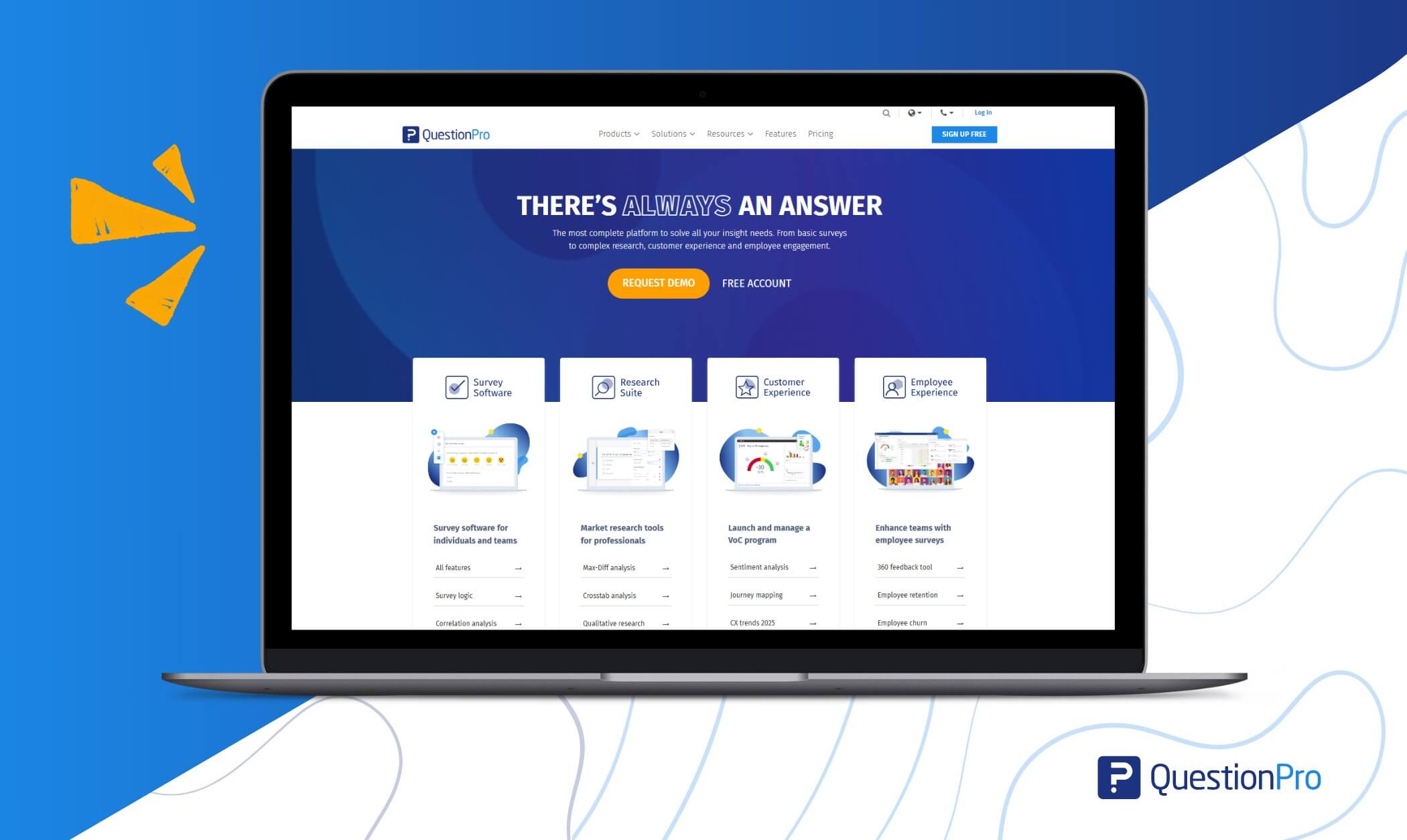
Features:
- 250+ survey templates (including employee engagement and eNPS).
- AI-powered analytics and sentiment analysis.
- Real-time dashboards for tracking feedback trends.
- Mobile-friendly surveys with offline capabilities.
- Integration with Slack, Microsoft Teams, and HRIS tools.
Limitations:
- Advanced features require more effort and resources to be effectively used.
Pricing:
- Free tier available.
- Paid plans start at $99/month.
2. Culture Amp
Culture Amp specializes in employee engagement with science-backed surveys and actionable insights.
Features:
- Benchmarking against 5,000+ companies.
- Manager-specific reporting.
- DEI and wellness survey templates.
- People science consulting.
Limitations:
- Minimum employee count requirements.
- No free plan.
- Complex setup for small teams.
Pricing:
- Pricing available upon request.
3. Qualtrics
Qualtrics is an enterprise-grade platform with powerful Employee Experience tools, combining surveys with predictive analytics and action planning.
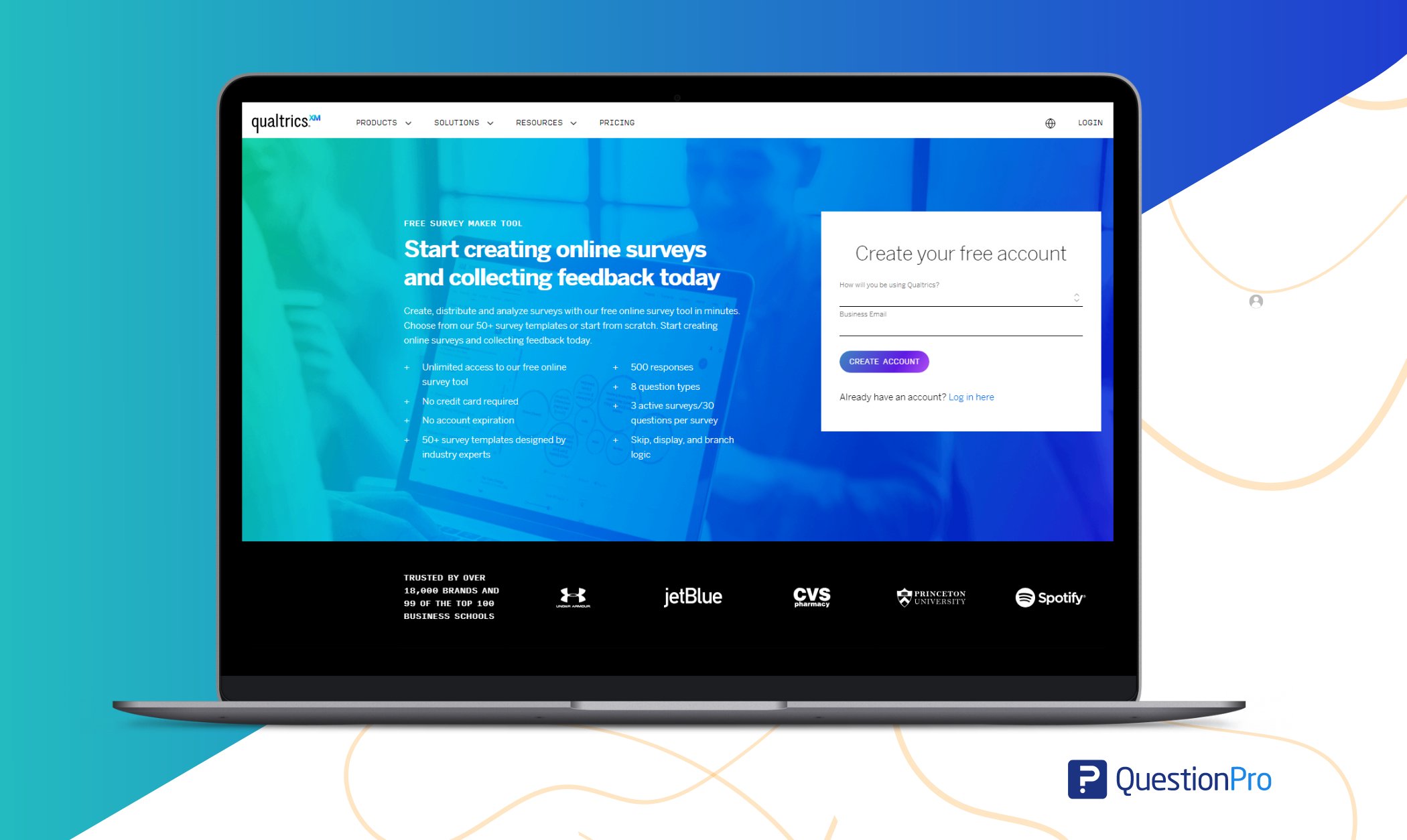
Features:
- Predictive intelligence to identify attrition risks.
- Automated follow-ups and closed-loop feedback.
- Benchmarking against industry standards.
- Advanced text analytics for open-ended responses.
Limitations:
- Too expensive for small businesses.
- Steepers learning curve for beginners.
Pricing:
- Pricing available upon request.
4. Zoho Survey
Zoho Survey provides simple and powerful survey tools that integrate seamlessly with the Zoho ecosystem.
Features:
- Multilingual survey support.
- Real-time response notifications.
- White-labeling options.
Limitations:
- Limited third-party integrations.
- Limited features in the free plan.
Pricing:
- Plans start at $7.42 per month.
5. SurveyMonkey
SurveyMonkey is a user-friendly platform popular for quick pulse surveys and customizable questionnaires.

Features:
- Instant analysis with SurveyMonkey Genius (AI survey maker).
- Team collaboration features.
- Mobile app for on-the-go feedback.
- Integrations with Zoom and Microsoft 365.
Limitations:
- Limited responses in the free plan.
- Higher pricing for advanced features.
Pricing:
- Free plan (10 questions/survey).
- Team plans start at $25/user/month..
6. CultureMonkey
CultureMonkey provides simple yet powerful engagement surveys with smart analytics.
Features:
- Anonymous feedback options.
- Real-time mood metrics.
- Automated Insights.
- Custom survey branding.
Limitations:
- Newer platform with fewer integrations.
- Basic reporting.
Pricing:
- Contact the sales team for pricing.
7. SurveySparrow
SurveySparrow offers conversational surveys with chat-like interfaces for better response rates.
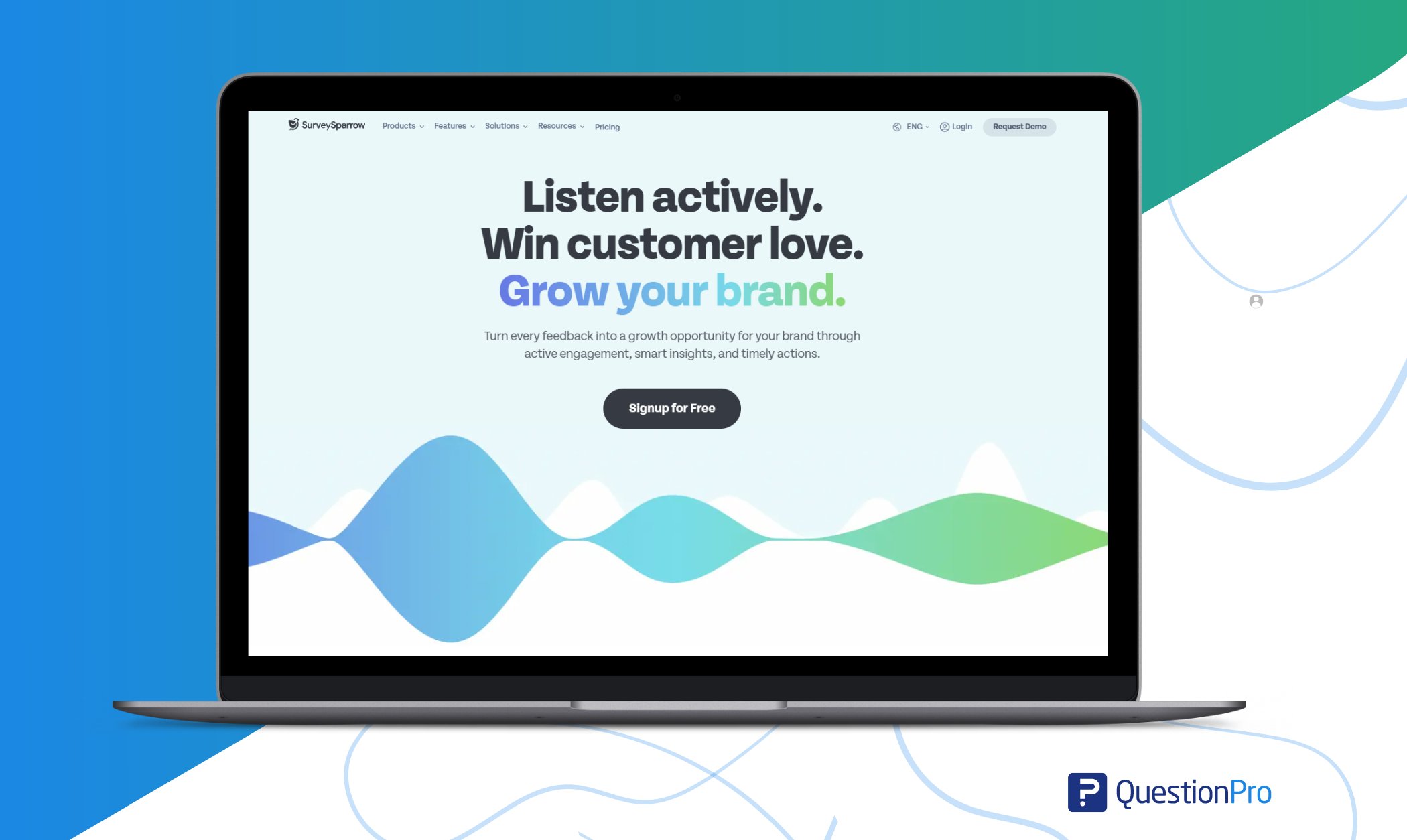
Features:
- Chat-style “conversational forms”.
- Recurring survey automation.
- 360-degree feedback tools.
- Employee experience metrics.
Limitations:
- Limited customization in the Free Plan.
- Higher pricing for advanced features.
Pricing:
- Free plan (limited features).
- Paid plans from $19/month.
8. Lattice
Lattice integrates surveys with performance reviews and goal tracking.
Features:
- Customizable survey cycles.
- DEI analytics dashboard.
- Manager action plans.
- Slack/Teams pulse surveys.
Limitations:
- Expensive for small teams.
- Complex interface.
- Annual billing only.
Pricing:
- Starts at $10/user/month.
9. 15Five
15Five combines surveys with performance management for continuous feedback loops.
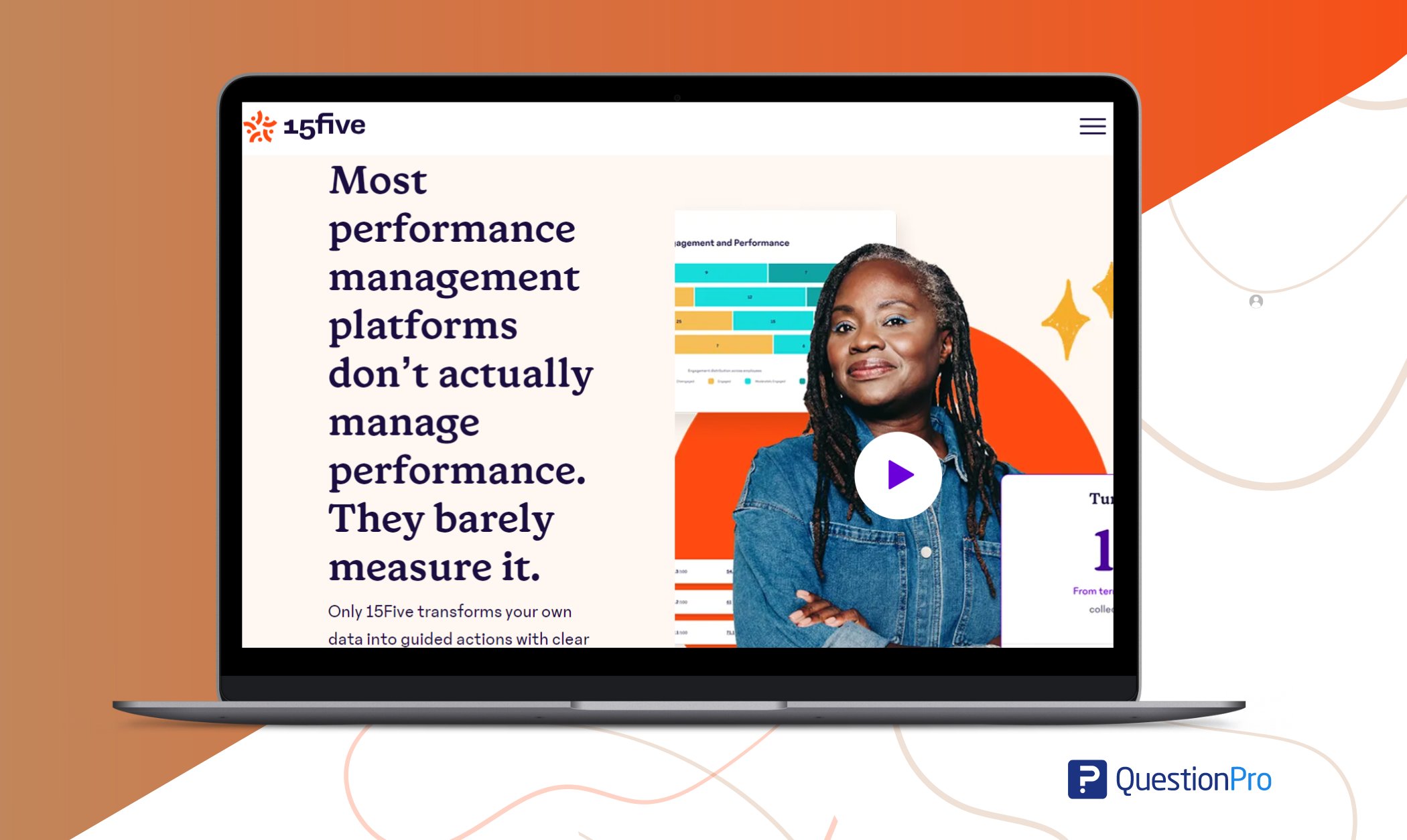
Features:
- Weekly pulse check-ins.
- OKR tracking integration.
- Manager coaching tools.
- Engagement/retention analytics.
Limitations:
- Limited survey customization.
- Mobile experience could improve.
- Focused more on managers than HR.
Pricing:
- Starts at $4/user/month.
10. Deel
Deel offers global employee surveys with compliance-focused features.
Features:
- Global survey distribution.
- Multilingual support.
- Compliance tracking.
- Contractor feedback tools.
Limitations:
- Limited to Deel users.
- Basic analytics.
- Few customization options.
Pricing:
- Pricing available upon request.
11. Jotform
Jotform offers flexible form builders that can be adapted for employee surveys.
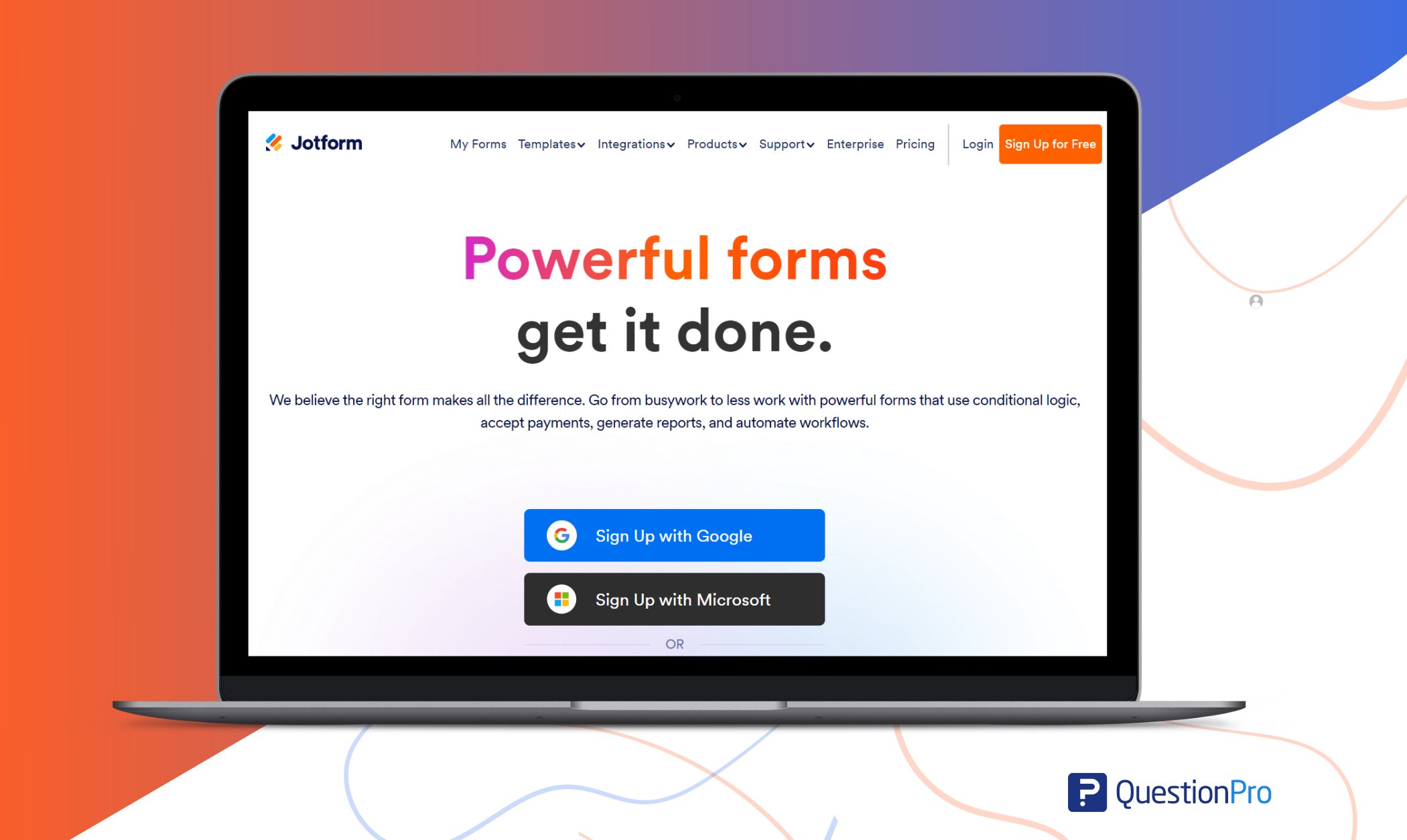
Features:
- Drag-and-drop form builder.
- 100+ employee survey templates.
- PDF report generation.
- Conditional logic.
Limitations:
- Limited reporting in the free plan.
- Can be overwhelming for beginners.
Pricing:
- Free plan available.
- Paid plans from $34/month.
Choosing a suitable platform depends on your organization’s size, budget, and specific needs. The right tool should make employee listening effortless, insightful, and actionable.
Learn More: Best Employee Survey Tools for Organizational Excellence.
Key Features to Look for in Employee Listening Platforms
Choosing the right employee listening platform can make or break your feedback strategy. Here are the most common features to consider when evaluating survey tools:
- Real-Time Analytics & Actionable Insights
A great platform transforms feedback into immediate, actionable insights. Look for dashboards that track Employee Net Promoter Score (eNPS), visualize trends across departments, and offer real-time feedback analysis. Advanced tools provide sentiment analysis of open-ended responses and predictive alerts about turnover risks or employee health concerns, helping you proactively address issues before they escalate.
- Anonymous & Safe Feedback Channels
Trust is the foundation of honest feedback. The best platforms ensure anonymity, especially for sensitive topics like diversity, equity, and inclusion (DEI) or workplace stress. Features like confidential reporting channels and secure data handling encourage employees to share candid insights about company values or career development barriers without fear.
- Customizable Survey Templates for Targeted Insights
Generic surveys miss the mark. Prioritize platforms with customizable survey templates for specific needs—DEI assessments, targeted surveys for remote teams, or survey questions about managerial effectiveness.
Multilingual support and mobile-friendly designs ensure inclusivity, while pulse surveys (one—to two-question check-ins) keep a finger on the workplace pulse.
For example, managers might receive alerts to address low engagement scores or schedule career development conversations based on feedback trends.
- Seamless Integration with HR Ecosystems
Your platform should sync with HRIS systems (to tie feedback to performance data), collaboration tools, and even learning platforms. This connectivity turns isolated feedback into a driver of organizational improvement.
These features ensure you’re collecting data and analyzing feedback to strengthen company values, boost retention, and create a workplace where employees thrive.
Why QuestionPro Employee Experience is your Best Choice?
QuestionPro Employee Experience stands out as a top-tier platform for organizations that are serious about employee feedback. Combining powerful analytics, customizable surveys, and AI-driven insights helps HR professionals build a culture of continuous improvement.
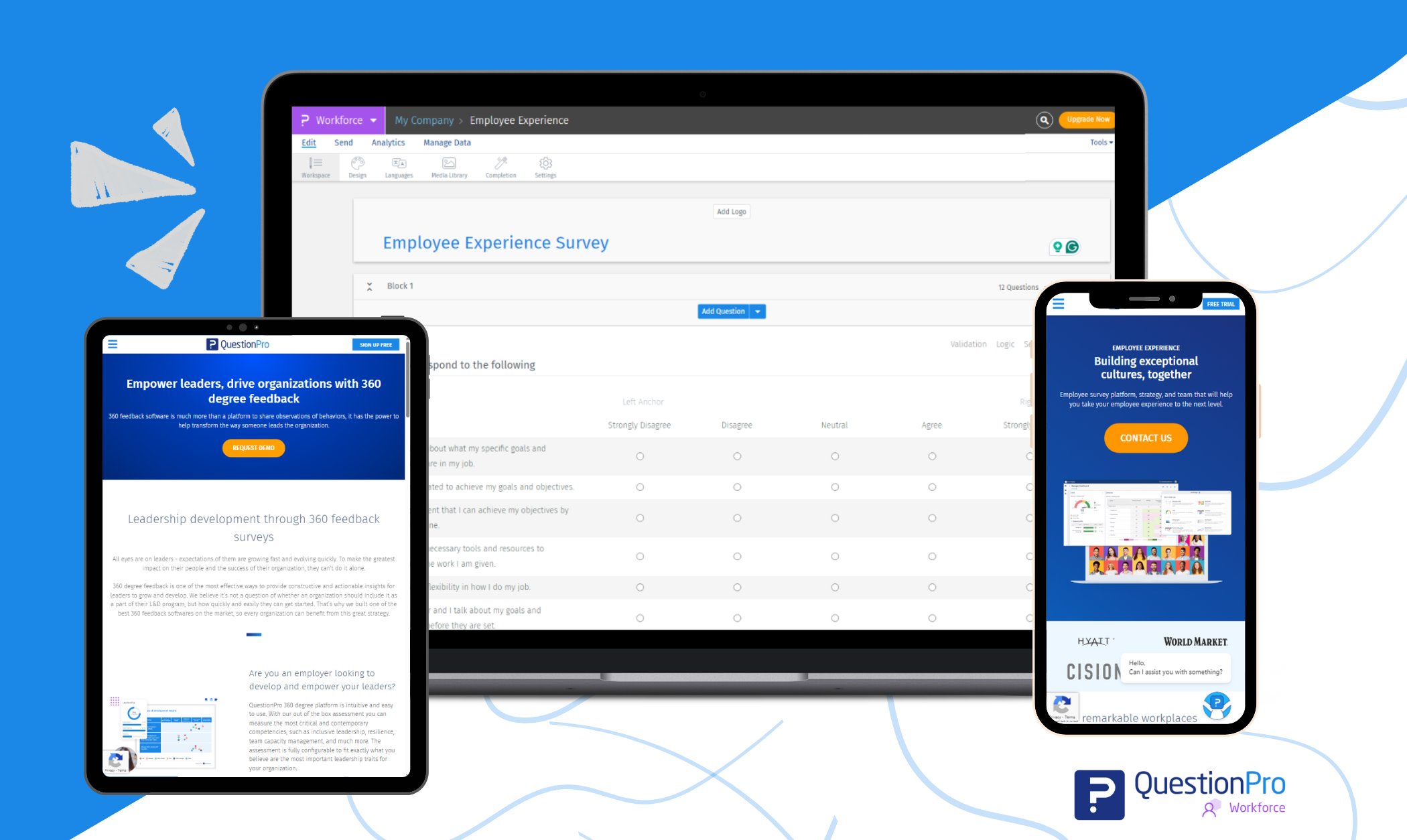
1. Advanced Employee Listening Tools
- Pulse surveys, lifecycle surveys, and always-on feedback channels ensure continuous listening.
- Anonymous feedback options encourage honest responses.
- AI-powered sentiment analysis detects underlying concerns in open-ended responses.
2. Actionable Insights & Predictive Analytics
This tool delivers real-time engagement dashboards, industry benchmarking, and predictive turnover analytics – turning employee feedback into actionable insights for smarter HR decisions.
3. Customizable & User-Friendly
QuestionPro offers many ready-to-use survey templates—including eNPS, employee engagement, and DEI surveys—saving you time on setup. Its drag-and-drop editor makes customization effortless, while mobile-friendly surveys ensure seamless participation from remote and deskless teams.
4. Pricing
While pricing is a crucial consideration, QuestionPro Employee Experience offers competitive pricing starting at $99.00 per month for its premium plan, making it an affordable option suitable for businesses of various sizes.
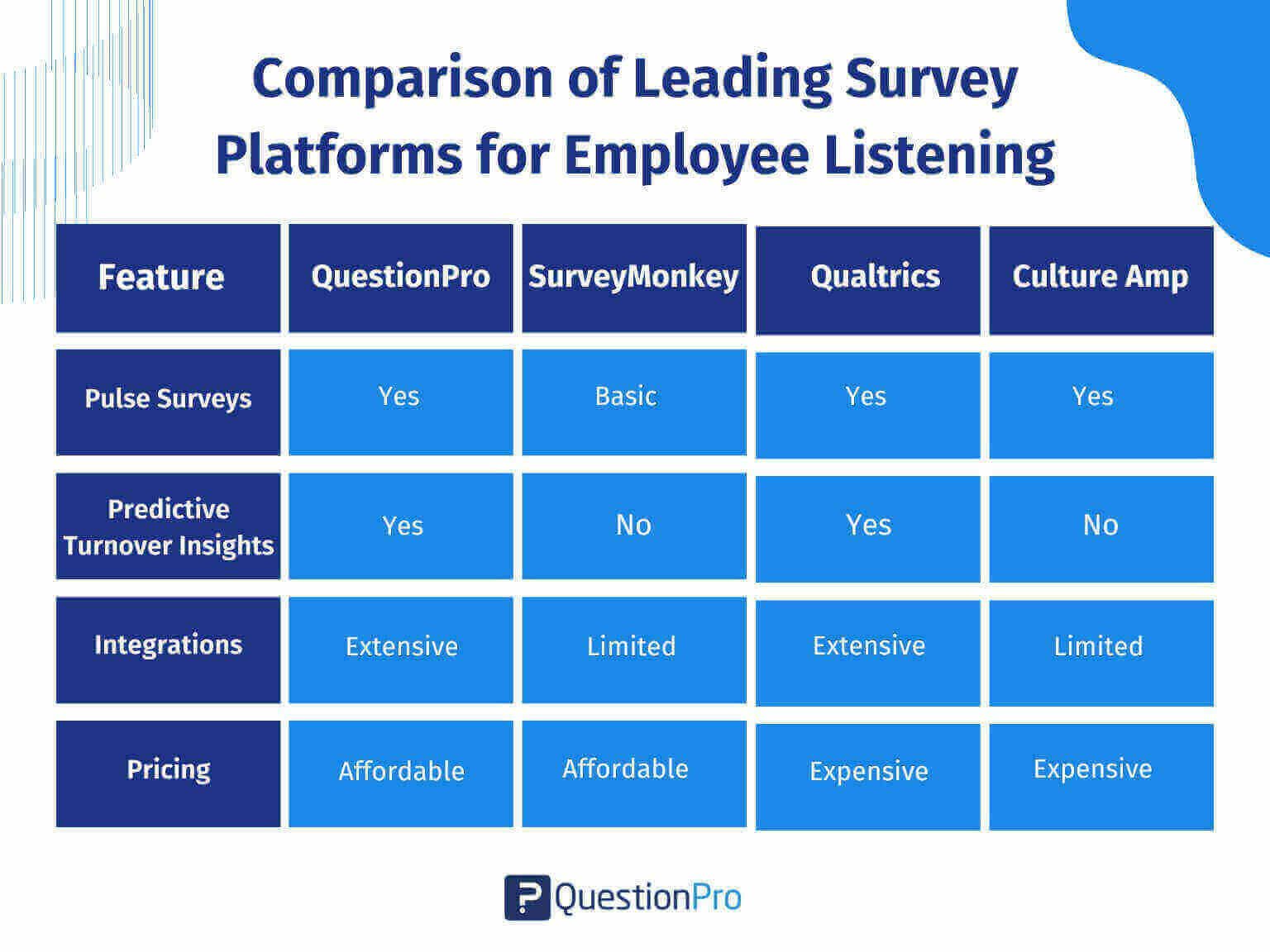
If you want a powerful yet cost-effective employee listening platform with AI-driven insights, seamless integrations, and actionable reporting, QuestionPro Employee Experience is one of the best survey platforms for employee listening.
Conclusion
Among these, QuestionPro stands out as a powerful, all-in-one solution. It combines AI-driven insights, real-time dashboards, and predictive attrition alerts to help HR teams turn feedback into meaningful action. Its customizable templates and seamless integrations make it a top choice for companies serious about data-driven employee engagement.
Ultimately, the best platform depends on your organization’s goals, budget, and tech stack. Whether you need deep analytics, continuous feedback loops, or simple pulse surveys, investing in the right tool ensures employees feel heard, and leaders can act confidently.
The future of work belongs to those who listen. Will your organization lead the way?
Frequently Asked Questions(FAQs)
Answer: The best platform for creating a survey depends on your specific needs, such as ease of use, features, pricing, and audience. But QuestionPro can be the best platform for you.
Answer: Employee listening boosts engagement, retention, and productivity by making staff feel valued. It helps leaders fix workplace issues, strengthen culture, and make smarter decisions. Happy employees mean better business results.
Answer: Yes! QuestionPro is beginner-friendly with an easy drag-and-drop builder, free plan, and ready-made templates—great for simple surveys.
Answer: Employee listening is the practice of gathering and acting on employee feedback through surveys, chats, and other tools to improve engagement, culture, and performance. It ensures employees feel heard and valued.
Answer: Employee listening boosts engagement, prevents problems, and fuels performance. By acting on feedback, companies show employees they’re valued—leading to higher retention, trust, and business success.




